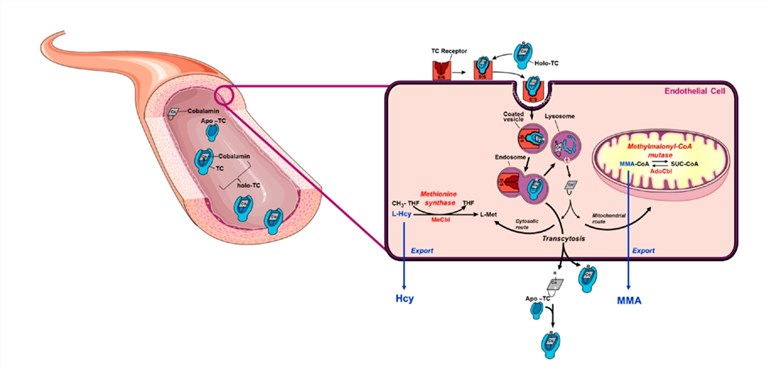What is TCN2 Protein
The Transcobalamin II (TCN2) protein, also known by its official full name "transcobalamin II" or its synonyms, such as haptocorrin and transcobalamin II (TCII), plays a crucial role in the transportation of vitamin B12 within the human body. As a member of the transcobalamin family, TCN2 is responsible for safeguarding and delivering this essential vitamin to cells, where it participates in various biochemical processes.
TCN2 Protein Structural Characteristics and Classification
Belonging to the transcobalamin family, TCN2 shares structural similarities with other proteins involved in vitamin B12 transport. Its structure comprises specific binding sites that interact with vitamin B12, ensuring its secure transit through the bloodstream. The protein consists of alpha-helices and beta-sheets, forming a complex tertiary structure critical for its biological functions.
Recent research has delved into understanding the intricate details of TCN2's structure and function. High-resolution imaging techniques, such as cryo-electron microscopy, have provided insights into the protein's three-dimensional structure, aiding scientists in comprehending its mechanisms at the molecular level. These advances have paved the way for a deeper understanding of TCN2's role in vitamin B12 metabolism.
TCN2 Biological Functions and Molecular Mechanisms
TCN2 serves as a carrier protein specifically designed for vitamin B12, an essential nutrient involved in DNA synthesis, red blood cell formation, and neurological function. Its primary function is to bind with vitamin B12 in the bloodstream, protecting it from degradation and facilitating its delivery to cells. Once inside cells, vitamin B12 participates in enzymatic reactions crucial for various physiological processes.
The molecular mechanisms underlying TCN2's function involve its high-affinity binding with vitamin B12. The protein recognizes and forms a complex with the vitamin, preventing its premature breakdown in the bloodstream. This complex is then internalized by cells through receptor-mediated endocytosis, ensuring a controlled and efficient delivery of vitamin B12 to target tissues.

Figure 1. Vitamin B12 metabolism. (Lederer A K, et al., 2019)
TCN2 Related Signaling Pathway
The signaling pathway associated with TCN2 primarily involves the cellular uptake of vitamin B12. Once TCN2 binds with vitamin B12, the complex interacts with specific cell surface receptors. This interaction triggers internalization through endocytosis, allowing the vitamin to enter cells efficiently. Dissecting this signal pathway provides valuable insights into potential therapeutic targets for conditions related to vitamin B12 deficiency.
TCN2 Related Diseases
Dysregulation or mutations in the TCN2 gene can lead to vitamin B12 deficiency, causing a range of health issues. Conditions such as megaloblastic anemia, neurological disorders, and cardiovascular complications can arise due to inadequate levels of vitamin B12. Understanding TCN2's role in disease pathology enables targeted diagnostic and therapeutic interventions for individuals at risk.
TCN2's Applications in Biomedicine
- Diagnostics Development
The precise role of TCN2 in vitamin B12 transport makes it a valuable biomarker for diagnosing conditions related to vitamin B12 deficiency. Detection of TCN2 levels in blood samples can aid in early diagnosis, allowing healthcare professionals to intervene promptly and administer appropriate treatments.
- Vaccine Development
TCN2's involvement in the transport of vitamin B12, a vital nutrient for the immune system, highlights its potential in vaccine development. Utilizing TCN2 as a carrier for vaccine components could enhance the targeted delivery of antigens, potentially improving vaccine efficacy and generating a more robust immune response.
- Therapeutics
Understanding TCN2's role opens avenues for developing therapeutic interventions. Targeting TCN2-related pathways could provide novel approaches for treating conditions associated with vitamin B12 deficiency. Additionally, exploring the potential of TCN2 as a drug delivery vehicle holds promise for improving the efficacy of certain medications.
| Cat.# | Product name | Species | Source (Host) | Tag |
|---|---|---|---|---|
| TCN2-429H | Recombinant Human TCN2, His tagged | Human | CHO | His |
| TCN2-873H | Recombinant Human TCN2, His tagged | Human | Human Cell | His |
| TCN2-570H | Recombinant Human TCN2 Protein, His-tagged | Human | E.coli | His |
| Tcn2-4074M | Recombinant Mouse Tcn2, His tagged | Mouse | Human Cell | His |
| TCN2-5991R | Recombinant Rat TCN2 Protein | Rat | Mammalian Cell | His |
| TCN2-5650R | Recombinant Rat TCN2 Protein, His (Fc)-Avi-tagged | Rat | HEK293 | His (Fc)-Avi |
| Tcn2-571R | Recombinant Rat Tcn2 Protein, His-tagged | Rat | E.coli | His |
| TCN2-6639Z | Recombinant Zebrafish TCN2 | Zebrafish | Mammalian Cell | His |
Reference
- Lederer A K, et al. Vitamin B12 status upon short-term intervention with a vegan diet—a randomized controlled trial in healthy participants. Nutrients. 2019, 11(11): 2815.

